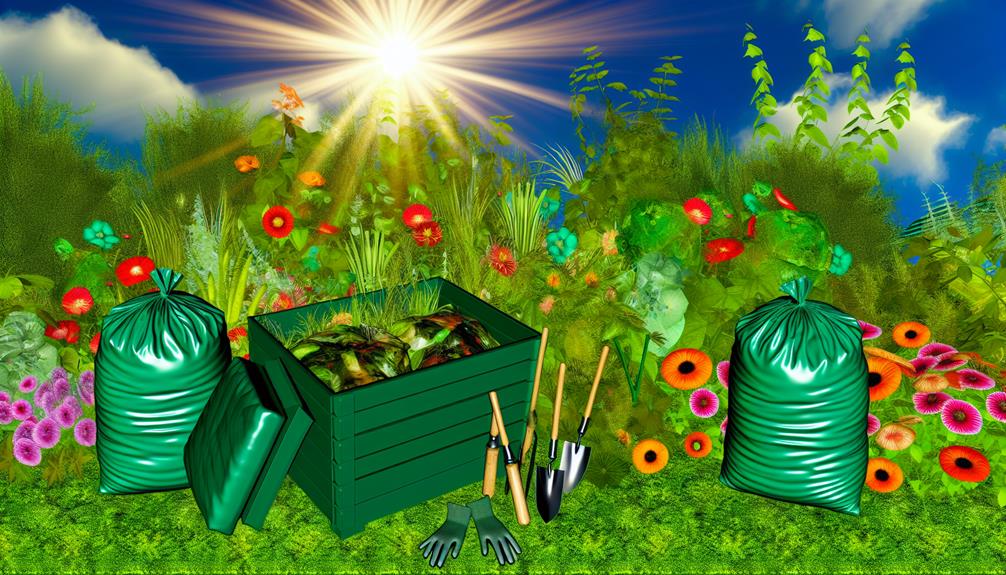

You can compost certain types of bags, and it’s a fantastic way to contribute to a sustainable environment! Paper bags, as long as they don’t have plastic coatings, can be torn into small pieces and added to your compost pile. They break down easily and balance green materials, creating rich soil perfect for gardening.
Biodegradable and compostable bags are also great choices—just make sure they’re properly labeled and shred them for quicker decomposition. However, avoid composting plastic bags, as they don’t break down and harm wildlife. Start composting the right bags today, and you’ll soon see the amazing benefits in your garden!
Composting is the process of turning organic waste like kitchen scraps and yard clippings into nutrient-rich soil. To start, you’ll need a good mix of green and brown materials. Greens are items like fruit peels and vegetable scraps, which provide nitrogen. Browns include dead leaves and cardboard, supplying carbon. This balance is essential for creating the ideal environment for microorganisms that break down the waste.
Turning your compost pile regularly adds oxygen, speeding up decomposition. Keep it moist but not soggy, like a wrung-out sponge. As you get into composting, you’ll find it’s a communal activity, connecting you with a shared goal of sustainability. The result? Rich, dark soil that boosts your garden and nurtures your sense of belonging.
Plastic bags can’t be composted because they’re not biodegradable, which means they don’t break down naturally. This has a significant environmental impact as they can linger in ecosystems for hundreds of years, harming wildlife and polluting our planet.
Instead of using plastic, consider alternatives like reusable cloth bags or biodegradable options to reduce your ecological footprint.
Many everyday items, including most plastic bags, don’t break down naturally and can’t be composted. These bags are made from petroleum-based materials, which means they can take hundreds of years to decompose. When you try to compost them, they just sit there, causing more harm than good.
Here’s a quick look at common bag types and their biodegradability:
| Bag Type | Biodegradable? | Compostable? |
|---|---|---|
| Traditional Plastic | No | No |
| Bioplastic | Sometimes | Sometimes |
| Paper | Yes | Yes |
Using non-biodegradable bags can make you feel like you’re part of the problem. But don’t worry, knowing this helps you make better choices. Opt for reusable or biodegradable bags to help the environment and belong to a community of eco-conscious individuals.
Understanding the environmental impact of plastic bags helps highlight why opting for biodegradable alternatives is so important. When you use plastic bags, they often end up in landfills or oceans, taking hundreds of years to break down. This prolonged decomposition releases harmful chemicals into the soil and water, affecting wildlife and ecosystems.
Plastic bags can also entangle marine animals, causing injury or death. You might see them littering your community, creating an unsightly mess and contributing to pollution. Making a conscious choice to avoid plastic bags not only reduces this environmental harm but also fosters a sense of responsibility and connection to the planet.
Together, we can make a positive difference by choosing eco-friendly options.
Switching to reusable bags made from materials like cotton, jute, or recycled fibers can greatly reduce your environmental footprint. It’s a simple yet impactful change that fosters a sense of community and responsibility. You’ll not only help the planet but also inspire others to do the same.
Here are three fantastic alternatives worth exploring:
Also Read: Can You Compost Acorns?
You can easily compost paper bags as long as they don’t have any plastic coatings or heavy ink. When you add paper bags to your compost pile, they break down quickly and help balance the green materials, like food scraps and grass clippings.

Tear the bags into smaller pieces to expedite decomposition. This simple step guarantees a thriving compost pile, creating rich, nutrient-dense soil for your garden.
Using paper bags in your composting practice fortifies your eco-friendly habits and connects you to a community of like-minded individuals working towards a sustainable future.
Also Read: Can You Compost Avocado?
While paper bags are a great addition to your compost pile, biodegradable bags offer another eco-friendly option to explore. These bags break down more quickly than traditional plastic, making them a perfect choice for those committed to sustainability.
To make sure you’re using biodegradable bags effectively, follow these steps:
When it comes to compostable bags, you’ll find various types made from materials like cornstarch and potato starch, which break down completely in composting environments.

These bags offer significant benefits, such as reducing landfill waste and providing nutrient-rich compost for your garden.
Several types of compostable bags are available, each designed for specific composting conditions and purposes. Understanding these options helps you choose the best one for your needs, reinforcing a sense of community and shared environmental responsibility.
Compostable bags offer an eco-friendly solution for waste disposal, reducing the environmental impact compared to traditional plastic bags. By switching to compostable bags, you’re actively contributing to a healthier planet. These bags break down into organic matter, enriching the soil and supporting plant growth. They also help reduce landfill waste, which lessens greenhouse gas emissions.
Using compostable bags feels great because you’re part of a community working towards sustainability. You’ll find that they’re just as durable and convenient as plastic bags, but with added benefits for the environment.
Imagine knowing that your waste is turning into something beneficial rather than harming our Earth. Let’s embrace compostable bags and make a difference together!
Also Read: Can You Compost Your Cotton Swabs? (This Might Surprise You)
Incorporating compostable bags into your routine is a simple way to make greener choices. By using these eco-friendly alternatives, you’re not only reducing waste but also contributing to a more sustainable future.
Here are three steps to get started:
By understanding the differences between plastic, paper, biodegradable, and compostable bags, you can make smarter choices for the environment.
Compostable bags are your best bet for eco-friendly disposal, as they break down naturally and enrich the soil.
So next time you shop, think about how your bag choices impact the planet. You’ll be taking a big step toward a greener future, making a real difference in reducing waste and promoting sustainability!
